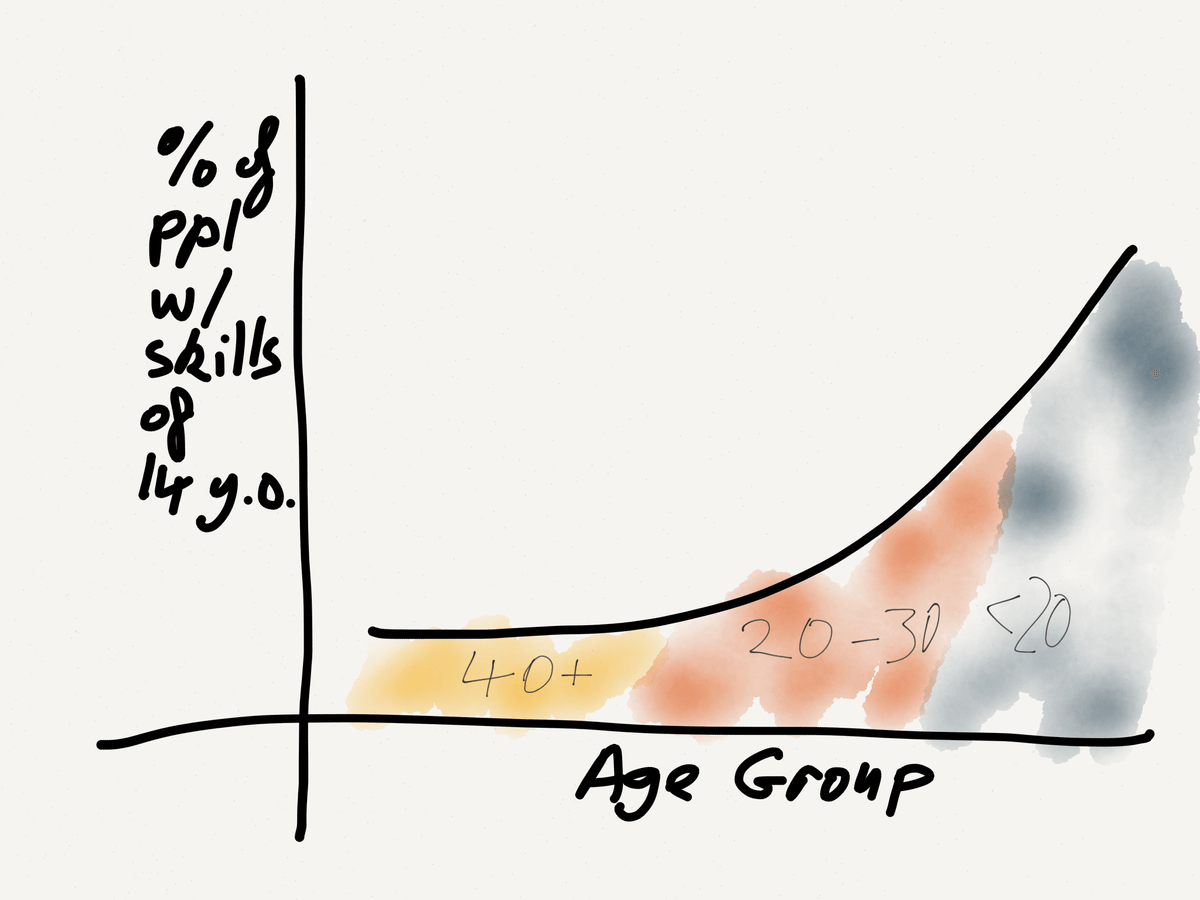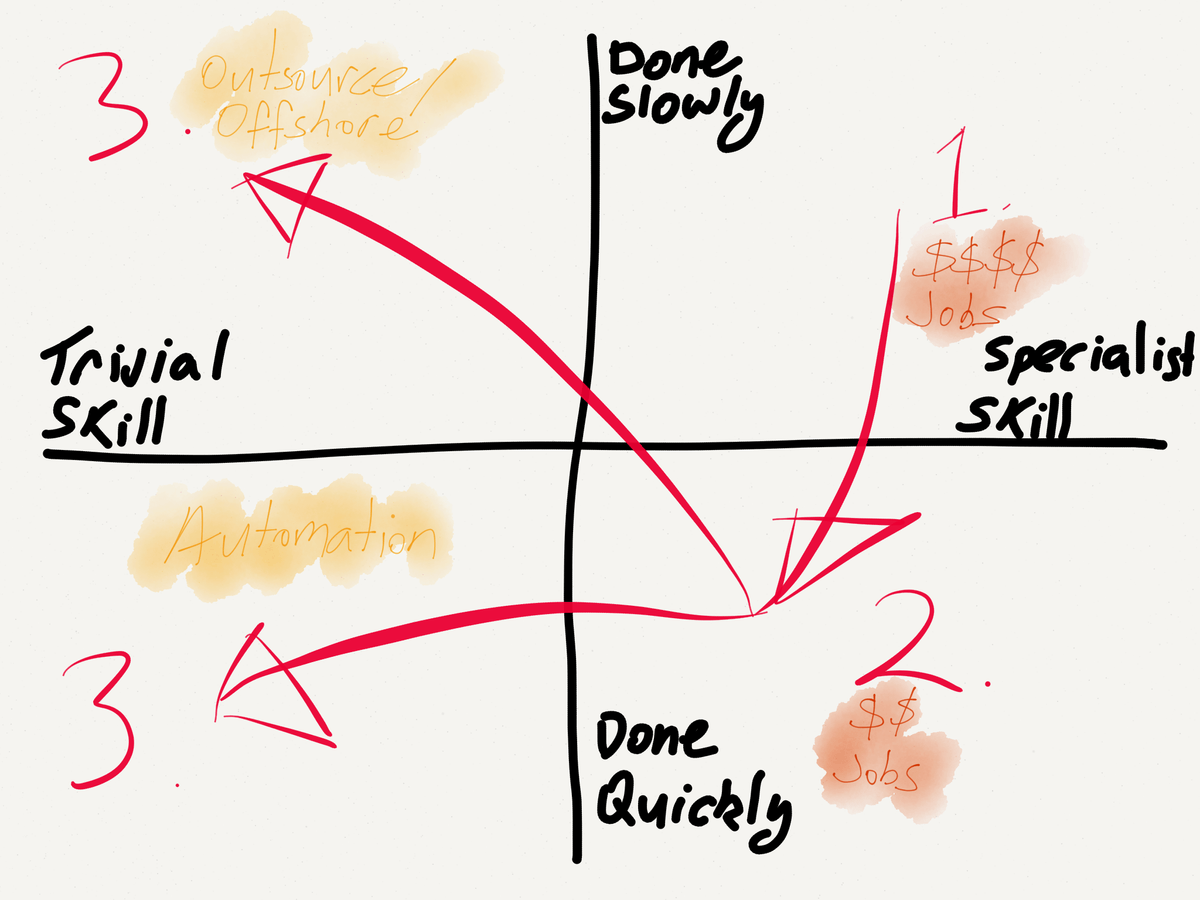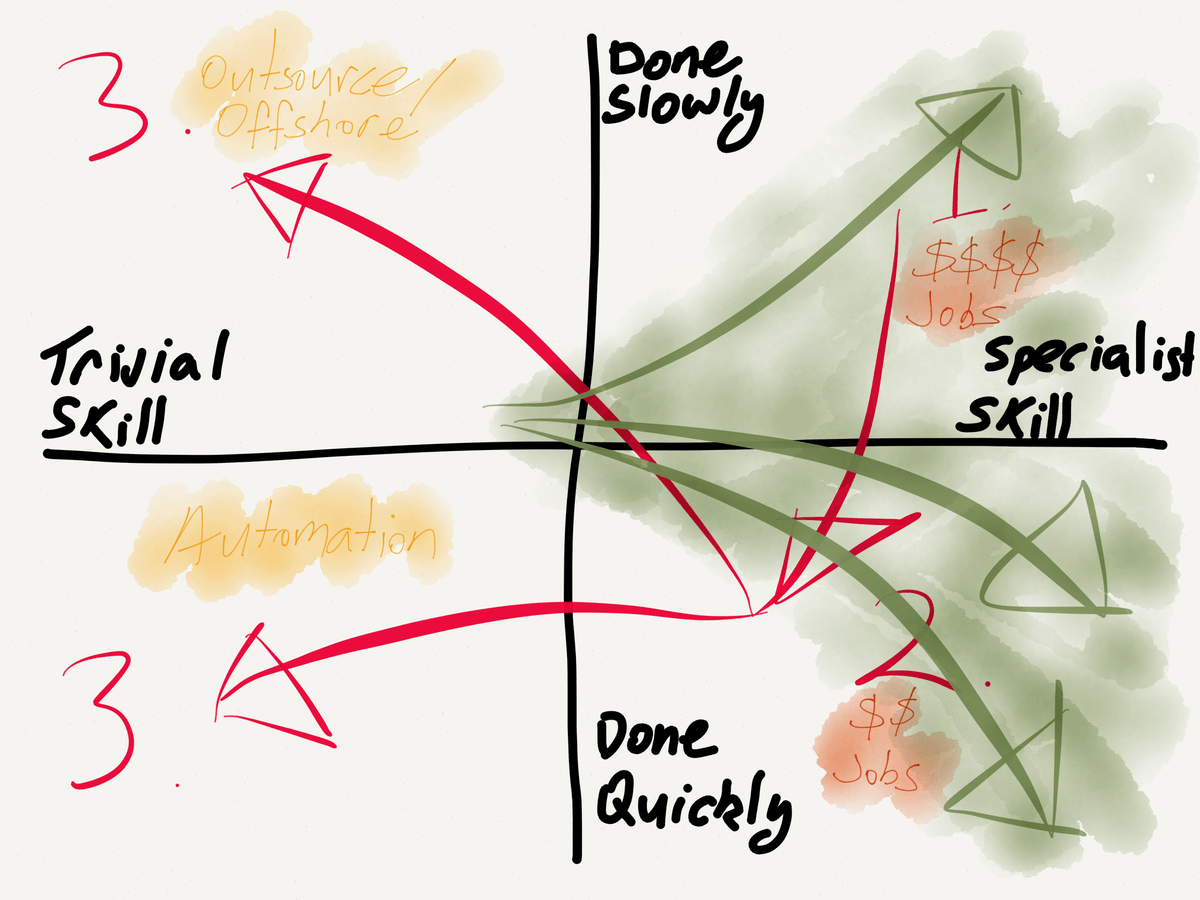Jobs to be done
Let’s start with an observation
The owner of this site programs and designs apps and websites. He also designs icons.
He is 14 years old.
There are a lot of “kids” doing this kind of thing nowadays.
Outside the population of people paid to do these things, I would bet less than 10% of the working population over the age of 40 would have any idea how to do these things to even a basic level of skill. I would also bet that % figure rises fast as the age group becomes younger.
I have drawn a fun[^1] illustration of this concept below:

This 14 year old’s skills have an important place in future economies.
I believe these skills, and others we currently regard as specialist skills, will become trivial skills in the future. The only unknown is when.
Think about the skills you have that you use at work every day. Which of these are skills that:
- No employer would pay extra for (i.e. are expected); and
- Are useful; and
- Once were the domain of specifically paid workers.
I can think of photocopying, typing, managing schedules, managing digital content, taking the elevator to the correct floor, making coffee.
These are all skills now considered so trivial that everyone is expected to do as part of their daily routine[^2].
A little bit of background
Whether we take a salary or run a business, we are “hired” for a “job” to be done. A “job to be done” is a useful framework to help understand what motivates and drives the business transactions underpinning the economy. Customers buy things, and businesses hire people because they find themselves with a problem they need solved.
Employees acquire skills and business operators apply these skills to solve the customers’ “problems”. These skills may be advanced degrees or acquired through work experience.
Problems get solved in new ways all the time.
New products enter markets because they solve problems in a better way (e.g. cheaper, easier or quicker)[^3].
As a consequence (or as a cause depending on the circumstances), businesses devise new or better ways to do things - requiring less employees or those with a different mixture of skills.
A little bit of illustrating
Below, I’ve drawn conceptually how salaried jobs/roles evolve over time:

For example, accounting and financial forecasting used to take ages. It used to takes ages and required an army of people. Educated people. Expensive people.
Businesses used to hire MBAs to model fancy financial concepts - and these MBAs could do it, they just needed an army of people recalculating every number whenever an input changed (which was often)[^4]. Businesses used to also hire armies of accountants, pencilling in entries into giant ledgers (made of paper[^5]).
Then these machines started popping up - Apple II’s with VisiCalc to be exact. Spreadsheets!
Spreadsheets made these tasks orders of magnitude quicker and as a result requiring less and differently skilled workers. Then, as computers became easier to use, spreadsheets quickly went from a specialist skill, to basic junior level work, to an expected skill. The operator transformed from a skilled analyst, to a macro button pusher and then into an ERP system generated report. The ERP systems are now all cloud-based[^6] and can be hosted and used anywhere by anyone, or, one day, by no-one at all.
So what we’ve seen over the last 30 years is that most of this work has been automated or offshored or done by one person when there used to be three.
The problem is still there. The job is still being done. The solution is just different.
Finally to my point
There are salaried jobs out there that one day everyone will be expected to do. There are even more jobs out there that will decrease in value and will be outsourced to the cheapest bidder.
These are the exact same jobs we currently think need “professional” training and expertise. The only thing we don’t know is which jobs and when. Some will make this transition over the next 5 years, others, 25 or 50 years. Given we are all living longer lives, there is a high chance we will experience these transitions. Some of us already are.
Some already have.
We have seen this happen to the automobile industry and more recently to the publishing industry.
The transition is slow and the signs are not obvious. It’s easy to attribute your salary freeze or company’s decline in sales to the economy. Yet, at the same time, a Google engineer’s starting salary is $100,000, the Dow Jones closed at a record high of ~18,000, and the revenue growth of Google, Amazon and Apple is phenomenal.
These businesses are not in new markets. Advertising, retail and consumer goods have been around for a very long time. These business are simply approaching the “job to be done” in a new way. New ways that require new skills.
These examples are also not unique. Just look at the steady stream of businesses starting up. Most are just solving old problems in new ways; and the few brilliant ones are solving new problems, creating new markets.
Having my professional skills become worthless one day is the one thing that scares the shit out of me.
One way to stop that from happening is to have substantially more useful skills than a 14 year old.
Optimism
Steve Ballmer quips here:
Salespeople at Microsoft are naturally optimistic, probably everywhere. Just tell us where to go and we’re gonna run! And I know we’re gonna succeed! Because people want to believe. Engineers, you say, here’s where we’re going to go, and the first thing they say is, oh, come on.
That’s not right. That’s not the right way to go. But I have found - and this might belie my fundamental optimism - that the engineer’s optimist is sometimes a little different than the salesman. While the salesman just says, where to go, charge, the engineer likes to say, the world is all screwed up, but I can fix it. That’s an engineer’s optimism to me. Everything’s— but I can fix it
To 2015.
Cheers.

[^1]: Or not so fun.
[^2]: Unless you bring in enough business to have the budget for a personal assistant (who you probably now share with 5 other people).
[^3]: Once in a while, products create entirely new markets because they solve problems that people didn’t realise existed or thought couldn’t be solved.
[^4]: Let’s not even go into error rates.
[^5]: For the kids out there.
[^6]: Magical puffs of magic and unicorns.